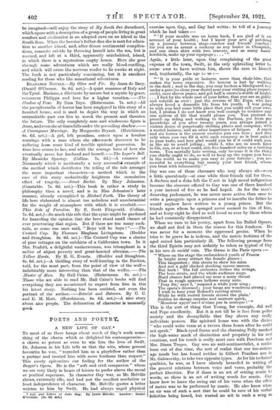READABLE NOVELS.—By Olive and Fir. By Anna de Bary. (Daniel
O'Connor. 8s. 6d. net.)—A quiet romance of Italy and the Tyrol. Mariano, a dilettante by nature but a mystic by grace, renounces Philippa and love for a higher vocation.—The Shadow of Fear. By Nina Toye. (Heinemann. 75. net.)—All the paraphernalia of horror has been emplpyed in this story of a haunted house, and is used to depict the way in which an nnspeakable past can live to wreck the present and threaten the future. The only completely sane and wholesome figure is Anne, and even she at times falls under the prevailing shadow.
-4 Courageous Marriage. By Marguerite Bryant. (Hutchinson. 'Ss. 6d. net.) —A girl, left penniless, enters upon a loveless marriage with a man whom she afterwards discovers to be suffering from some kind of terrible spiritual possession. In time love comes to her, and with the courage born of love she eventually saves her husband and herself.—The Leper's Bell. By Massicks Sparroy. (Collins. 7s. 6d.)—A romance of Normandy which is incidentally a very successful example of the method which distributes the telling of the tale amongst the more important characters—a method which in the case of this story undoubtedly heightens the cumulative effect of tragedy.—Sweet Rocket. By Mary Johnston. (Constable. 7s. 6d. net.)—This book is rather a study in philosophy than a novel, and is in Miss Johnston's later manner, already exemplified in Michael Forth. The theory of life here elaborated is almost too nebulous and unsubstantial for the weight of atmosphere with which it is overlaid.— This Side of Paradise. By F. Scott Fitzgerald. (Coffins. 7s. 6d. net.)—So much this side that the cynic might be pardoned for hazarding the opinion that the hero stood small chance of ever penetrating that region. But if there are too many cock- tails, as some one once said, " Boys will be boys ! "—The Custard Cup. By Florence Bingham Livingstone. (Hodder and Stoughton. 8s. 6d. net.)—The Custard Cup was a cluster of poor cottages on the outskirts of a Californian town. In it Mrs. Penfold, a delightful washerwoman, was triumphant in a milieu of abject poverty and great-hearted altruism.—The Yellow Horde. By H. G. Emits. {Hodder and Stoughton. Ss. 6d. net.)—A thrilling story of wolf-hunting in the Rockies, told, for the most part, from the point of view of the wolf— indubitably more interesting than that of the Wolfer. The Master of Man. By Hall Caine. (Heinemann. 6s. net.)— Those who are able to read Mr. Hall Caine's books will find everything they are accustomed to expect from him in this his latest -story. Nothing has been omitted, not even the portrait of the author.—Betwixt and Between. By C. C. and E. M. Mott. (Hutohinson. 8s. 6d. net.)—A nice story About nice people. The delineation of character is unusually good,


































 Previous page
Previous page